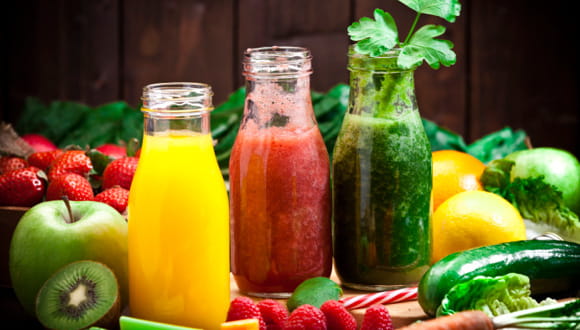Are Juice Cleanses Actually Good for You?
Jan. 6, 2020 - Katie McCallumWhether you're considering turning to a juice cleanse to lose weight or because your body needs to "detoxify," it's important to first weigh the pros and cons of this short, but restrictive diet trend.
"Juice cleansing is a diet where a person almost exclusively drinks fruit and vegetable juices for as long as 10 days or as short as just a day or two," says Amanda Beaver, wellness dietitian at Houston Methodist. "While it might sound healthy, it's best to look at what the science says about juice cleanses before giving into the hype."Beaver breaks down the benefits and risks of juice cleansing, whether it actually helps with weight loss and detoxifying, and offers advice about what you should do instead.
The benefits of juice cleansing
The positive side of juice cleansing is probably pretty obvious — you're consuming plenty of fruits and vegetables, which we know should make up half of our plate.
"Studies have shown that fruit and vegetable juices can boost levels of important vitamins and antioxidants, including folate, vitamin C, vitamin E and beta carotene," says Beaver. So, in theory, a juice cleanse is helpful for people who find it hard to eat enough fruits and vegetables. But, as the old saying goes: Too much of a good thing can be a bad thing.
Juice cleansing comes with health risks
In reality, juice cleansing isn't particularly healthy, and many juice cleansing companies actually downplay the health risks of restricting your diet to just juice.
According to Beaver, there are major downsides to juice cleansing:
- The resulting nutrient deficiencies. Fruit and vegetable juice is almost completely devoid of protein, healthful fats and certain vitamins (like B12) — all of which are vital to health.
- Fiber is stripped out of fruits and vegetables during the juicing process. Fiber is important for 'feeding' the healthy bacteria in our gut — helping us feel full, keeping blood sugar from going up too quickly and preventing constipation.
- It causes undesirable side effects. The low calorie content of most juices can elicit fatigue, headaches, cravings and dizziness.
- It may lead to muscle and bone loss. Because juice contains limited amount of protein, your muscles and bones can be affected.
There are even bigger health concerns for some individuals, such as those with kidney issues.
"Anyone with kidney disease should not undergo a juice cleanse," warns Beaver. "The kidneys are responsible for removing oxalate, which can be found in high levels in some juices."
Do juice cleanses help with weight loss?
Admittedly, juice cleanses can lead to short-term weight loss, but this doesn't mean it's a healthy way to lose weight.
"Not only is rapid weight loss unhealthy, but it doesn't last," says Beaver. "The number on the scale may be lower, but that doesn't mean any fat has been lost."
Beaver says that the weight loss you may see is mostly due to the lack of food in your GI tract and the loss of muscle experienced during a juice cleanse. What's more is that muscle loss slows metabolism, which may actually contribute to weight gain once you start eating regular food again.
"More than likely, any weight that was lost will be regained shortly after solid foods are reintroduced," says Beaver, "with the potential added downsides of a slower metabolism and bone loss."
Do juice cleanses help with detoxifying?
Maybe your diet has been worse than usual. Greasy foods, too much alcohol. You just feel like you need a 'detox' and a juice cleanse sounds like the perfect solution. But, science tells us that this is not the way to go. Plus, our bodies are highly effective at detoxifying on their own.
"The science of detoxifying is still being researched, so don't fall for the marketing ploys that juice cleansing companies are trying to sell you," says Beaver. "Instead, focus on eating whole foods, including veggies, fruits, beans, nuts and whole grains. The fiber from these foods is thought to help eliminate some toxins, while their phytochemicals may help promote the detoxification of carcinogens."
As a take-home message, Beaver says eating a well-balanced diet containing adequate amounts of vitamins (including B vitamins) helps support the body's natural detoxification pathways.
Healthy alternatives to juice cleansing
There are quite a few downsides to juice cleanses. Rather than signing up for a week of juice, or opting for a juice instead of a meal, Beaver recommends blending your fruits and vegetables (rather than juicing them) and eating whole fruits and/or vegetables along with a protein source.
"One delicious way to get the potential benefits of juicing, plus the natural fiber from these foods, is to enjoy fruits and veggies in smoothie form," explains Beaver. "This is a great way to get in your recommended daily servings of fruits and veggies."
Beaver recommends trying to blend your favorite fruits and veggies with some Greek yogurt or soy milk for protein. For a green smoothie, pair kale or spinach with a frozen banana. For a beautiful pink smoothie, pair berries with a little bit of frozen cauliflower.
Even better, though, is eating your fruits and veggies whole — which also helps you feel fuller longer after a meal.
"One easy way to get your veggies in is to stir-fry your favorites and add a protein source like chicken or edamame," suggests Beaver.
In the end, it's important to know that while juices themselves can be healthy, they're not nutritionally balanced and shouldn't be used as meal replacements. So, this year, skip the juice cleanse and enjoy whole fruits and veggies as a part of your meals and snacks, or blend them to make a delicious smoothie.








